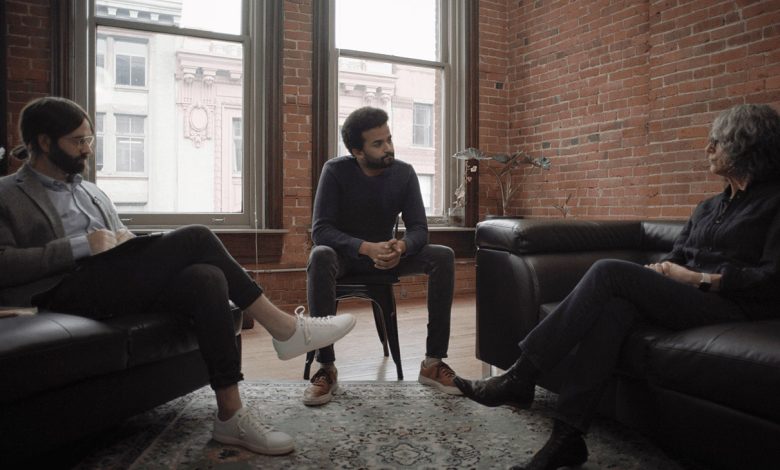How ‘Am I Racist?’ Scored the Top Political Doc Opening in 20 Years by Duping DEI Gurus

[This story contains spoilers for Am I Racist?]
“Decolonize yourself. Do your own white supremacy dismantling, and then you can start to bring in other people,” declares Regina Jackson at a Race2Dinner in Atlanta, part of an ongoing series she co-founded with Saira Rao designed to help white women confront their own racism, white supremacy and xenophobia. Before anyone can respond, the waiter proposes a toast, instructing guests to “raise a glass if you’re racist.” They all oblige — although Jackson, who is Black, quickly puts her glass down and laughs. “Oh, I’m not racist,” she says.
The seemingly klutzy caterer has been interrupting the group all night long, dropping dishes and even pulling up a seat to explain that he’s got his DEI (diversity, equity and inclusion) certificate. Many of the guests appear confused and perplexed by his odd behavior. “I’m just on the journey,” he says.
He is on a journey — just not the one he professed to be on. He’s actually the conservative provocateur Matt Walsh, who, with the backing of Jeremy Boreing and Ben Shapiro’s right-wing media company The Daily Wire, spent months filming the documentary Am I Racist?, a comedic and scathing takedown of the DEI movement.
Borrowing a page from Sacha Baron Cohen’s Da Ali G Show and Borat, the producers set up elaborate and surreptitious ruses, telling their subjects they were making a doc exploring anti-racism in America in the post-George Floyd era. And they were willing to pay handsomely; among other expenses, they gained permission to film the Race2Dinner event after writing a check for $5,000 and paid the mother of two small Black girls snubbed by a Sesame Street character at a theme park $50,000 to participate in the doc. It isn’t uncommon for experts and other subjects to be paid in such instances, but the boundaries have loosened in the era of streaming and the endless demand for nonfiction content.
Their tactics have worked to create a surprise hit.
Over the Sept. 13-15 weekend, Am I Racist? — fueled by conservative moviegoers in cities like Nashville, Denver, Phoenix, Dallas and Meridian, a suburb of Boise, Idaho — seemingly came out of nowhere to gross $4.5 million from 1,517 screens across North America — the top opening for a political documentary since Michael Moore’s Fahrenheit 9/11 two decades ago in 2004. The movie shot up the chart to No. 4 and did almost double the business of Dave Bautista’s action-thriller The Killer’s Game ($2.6 million).
“The picture has clearly hit a nerve,” says one major Hollywood studio exec. “Kudos to them for marketing to the correct audience.” One detractor, however, notes that many conservative-leaning movies have done more business of late, including the Ronald Reagan biopic Reagan. The Dennis Quaid starrer opened to $7.6 million.
Am I Racist? is showing no signs of slowing down and sported a cume north of $6.5 million by Thursday. It has come in No. 3 or No. 4 every day this week and is adding dozens of theaters daily. As of Friday, it is playing in 1,600 theaters. It’s doing best in the South, Midwest and central mountain states. Its jaw-dropping status doesn’t end there. It scored the fourth-biggest opening in a decade for a doc, excluding concert pics. No. 1 is the faith-based film After Death, which debuted to $5 million in 2023. That film, exploring the afterlife, is from the conservative-leaning and faith-based Angel Studios, home of the 2023 box office hit Sound of Freedom. Another faith-based distributor, SDG, is teaming with Daily Wire in bringing Am I Racist? to the big screen.
Am I Racist? is Daily Wire’s first theatrical release and is another win for Walsh — a widely followed right-wing podcaster and author — and for director-producer Justin Folk, a disillusioned Hollywood below-the-line worker whose credits include special effects work on two of the Matrix movies and The Incredible Hulk. The two previously collaborated on 2022 Daily Wire movie What Is a Woman?, another controversial film, which took aim in the same way at the transgender community. The film amassed a huge online viewership on social media and Daily Wire, which has a monthly reach of 220 million viewers, including 1 million paid subscribers. Daily Wire held screenings at colleges across the country, but some of those efforts were stymied when Eventbrite took down listings for screenings on the basis of violations to its community guidelines: “We do not permit events, content, or creators that promote or encourage hate, violence, or harassment towards others and/or oneself.”
Walsh and Folk feel zero qualms about the surreptitious tactics they employed to land interviews for their latest project. Walsh knew that no DEI pundit would be frank with him if they knew who he really was, so he decided to don a man-bun wig, skinny jeans and white sneakers when interviewing his subjects. And like the team behind Borat, the film’s producers gave fake names for the film and didn’t disclose The Daily Wire’s involvement.
“For a lot of these people, if they suspect that you don’t agree with them, they’re going to just clam up, or they’re going to give you some bullshit talking points and you’re not going to get what this thing is really about, which makes for a boring movie and it also makes it a lot less meaningful,” Walsh tells The Hollywood Reporter.
Folk adds that “the distinction between our movies and Borat is that Borat is making fun of everyday Americans.” He goes on to say, “Our goal wasn’t to make fun of people, it was to really bring to light the bad ideas that are out there that are dividing our country.”
Folk says no one was taken out of context, nor was there any “manipulative editing.” He notes, “They may not like being in the movie, but again, I think they would stand by every word that they said.”
The experts Folk refers to are of a different mindset. To Race2Dinner’s Jackson and Rao, Walsh and his documentary represent the crux of the problem they are trying to address. The outspoken entrepreneurs — who were dropped by CAA last year after Rao voiced support for Palestine — shared their views in separate comments to THR.
“White people spending millions of dollars to make and see a ‘movie’ mocking Black, brown and white women trying to make the world a slightly less horrendous place is equal parts pathetic and depraved and totally on point for America,” Rao says. For her part, Jackson says, “Until white people decide that they are interested in calculable change in a fearful, violent, hate-ridden, gun-loving, child-killing society, nothing will change.”
At the time of the dinner, Race2Dinner’s social media account posted an exuberant report of the evening saying they’d taken part in an upcoming documentary (the post has since been deleted).
For Walsh, the greatest the coup d’etat was getting Robin DiAngelo, the best-selling author of White Fragility: Why It’s So Hard for White People to Talk About Racism, to pay $30 in reparations to Am I Racist? producer Benyam Capel during an interview with Walsh’s made-up character. As the sit-down begins, a chyron on the screen flashes $15,000, the fee DiAngelo was paid to participate in the doc.
At some point during the chat, Walsh asks if his producer, whom he only identifies as Ben and is Black, can join them. Walsh suggests making on-the-spot reparations, pulls out money from his wallet and hands it to Capel. “This is really weird,” DiAngelo says. After asking Ben directly if he’s OK with it, he says it is. She retrieves all the cash in her purse, which turns out to be $30 (the chyron flashes again, only this time, it says $14,970).
Capel says he was “over the moon” that DiAngelo had the conviction to follow the “logical conclusion” of her own ideology. “It’s ridiculously insulting to Black people because ultimately saying that for a Black man, such as myself, to have a shot, that I can’t get there on my own merits, and that white people are going to have to lower themselves down for me to have an opportunity to rise to any level of station in this country.” (Capel was even more surprised when he and Walsh stood in the shadow of the Washington Monument and collected more than 20 signatures to rename the iconic obelisk the George Floyd monument and paint it black. “To see it get that amount of support was shocking and disappointing,” he says).
Walsh and Folk say they aren’t sure they could have executed the film without the pivotal reparations scene. And the film’s marketing team made maximum use of the scene prior the film’s release. Around the same time, DiAngelo issued a lengthy statement explaining she’d been contacted by a group “claiming to be making a documentary film called Shades of Justice that address racism in the United States by speaking with anti-racist activists, authors and thought leaders in service of supporting the cause of racial equity. They offered me between $10-20,000 for an interview. I said let’s meet in the middle with $15,000 and agreed to participate (I have since donated that sum to the NAACP Legal Defense Fund).”
DiAngelo said while a few things “felt off,” including the interviewer, who called himself Matt, appearing to be wearing an ill-fitting wig, the conversation seemed earnest and non-adversarial. “By the end, however, things go weird,” she wrote in reference to the question of reparations for Black Americans.
“He then pulled up a chair and invited a Black crew-member who went by ‘Ben’ to sit with us, took out his wallet and handed Ben some cash. He said that if I believed in reparations, I should also give Ben cash. While some Black people have asked white people to engage in reparations by giving directly to individuals, reparations are generally understood as a systemic approach to past and current injustice. The way Matt set this up felt intended to put Ben and I on the spot. Because Matt was pushing this on us, I expressed my discomfort and checked in with Ben, to be sure he was okay with receiving cash in this way. Ben reassured me that he was, so I went to my wallet and handed him my cash and the interview ended.”
DiAngelo reached out to the contact person for the project, who went by the name Lee Hampton, to express her concerns over the scene and ask that it not be used. He said no decision had been made, but never against responded or reached out.
“After reviewing the sequence of events and discussing it with colleagues, I realized that they had lied about their agenda and I had been played,” she continued. “I spread the word on my networks. Unfortunately, last month I started receiving hateful and misogynistic emails. Some referenced the Daily Wire (Ben Shapiro’s website), which announced that the film is indeed being released.”
Walsh’s interview subjects weren’t the only ones who were paid. Walsh himself received more than $3,000 for hosting his own DEI workshop that he advertised on Craigslist, and which provides fodder for the end of the doc. Some of the attendees catch on and quickly bolt, but there’s still a small group left when Walsh pulls out a box of whips and paddles so that people can engage in self-flagellation. He actually gets as far as passing the implements out, but then stops and calls it a day. “The whole goal all along was to find out how far people would go to, especially white people, to absolve themselves of racial guilt. And apparently, it’s pretty far,” says Folk.
The only time Walsh got outed, so to speak, was when attending a DEI workshop the producers paid $30,000 for to help facilitate and shoot. He didn’t mask his physical identity. The group figured out he’s Matt Walsh after he asked if it was OK if he went to the “cry room,” a place where attendees can process their feelings. While he was gone, the film crew captured everyone looking on their phones, googling his identity. When Walsh returned, he was asked to leave. One unidentified woman even called the authorities.
What happened next was not revealed in the doc. But in a police report obtained by THR, the woman said she and another attendee felt so nervous about their safety that they considered throwing a chair through a window. She also told the investigator that one of the responding officers was familiar with Matt Walsh. The investigator said what the officer does off duty is his own business.
Am I Racist? may have been Daily Wire’s first theatrical release, but, with the aid of SDG, it used traditional marketing tactics, such as holding more than 30 targeted screenings and also reaching out to mainstream critics. The film initially didn’t have enough reviews to warrant a Rotten Tomatoes critics score but boasts a 99 percent audience score (a factoid Elon Musk has been tweeting about). But by Thurdsay, a 10th critic review posted, and pushed the project to an 80 percent critics rating on Rotten Tomatoes. It also received an A CinemaScore and stellar PostTrak exits, in a sign the film could have long legs at the box office. The vast majority of theaters have no problem playing Am I Racist?, although Prime Cinemas Del Oro Theatre in Grass Valley, California, pulled the film, citing safety concerns. The cinema did not respond to a request for comment.
For Walsh, a priority was always to make Am I Racist? a comedy documentary — he rejects the notion that it is mockumentary — and for “all the scenes to be funny.” He also revealed the conclusion to that scene with DiAngelo: “When the cameras were turned off, I took my money back [from Ben], I’ll tell you that,” he says.
Source: Hollywoodreporter
Related Posts
- Roundball Rocked: With NBA Return Looming, NBC Purges Scripted Roster
- SoundCloud Says It “Has Never Used Artist Content to Train AI Models” After Backlash on Terms of Service Change
- Fox News’ Camryn Kinsey Is “Doing Well” After Fainting on Live TV
- Kerry Washington and Jahleel Kamera in 'Shadow Force.'
Courtesy of Lionsgate
…
- This Alternative Artist Landed a Top-20 Chart Debut With an Album Made Almost Entirely on His Phone





